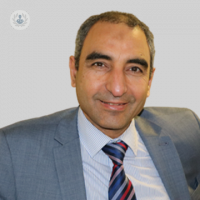Menopause: How does it affect the body?
Written by:In this informative article, highly respected consultant gynaecologist Professor Saad Amer offers his expert insight on how menopause can affect the body, including the most common symptoms that women experience. The revered specialist also sheds light on the available treatment options and the role of lifestyle changes and natural remedies in managing symptoms of the menopause.

How does menopause affect the body?
The menopause is a natural physiological phenomenon where the ovarian function comes to an end, meaning that oestrogen is no longer produced. Oestrogen is a hormone that affects almost all tissues and cells of the body, so this deficiency has an impact on almost every part of the woman's body.
The most common features relate to the cardiovascular system and vasomotor symptoms like hot flushes, night sweats and feeling quite warm most of the time. It also has an impact on the skin, including the skin on the genitalia which can change and become dry, as can the mouth. The menopause also has effect on a woman’s neurophysiology, with side effects of brain fog and some irritability, anxiety and tearfulness. There is a long list of effects that the menopause can have on many parts of the body.
What are the most effective treatments for menopause symptoms?
The most effective treatment depends on the severity of the symptoms and the impact on the woman’s life. These days, it is well recognised that menopause, similar to chronic pelvic pain, can have a serious impact on women’s quality of life, especially their mental health and this is why treatment depends on which symptoms the patient presents with.
Some women present with minimal symptoms and they are reassured that the menopause is a physiological event that women go through, especially if it happens at the right age. Obviously, when the menopause occurs in young women and starts very early, what we call premature menopause, then that is a different situation.
Within the normal age range of menopause, which is beyond forty-five, women suffering from severe oestrogen deficiency symptoms, especially in their cognitive function, can be offered oestrogen therapy, also known as hormone replacement therapy (HRT).
Are there any natural remedies, lifestyle changes or habits that can help manage menopause symptoms?
Yes, there are a lot of natural remedies, herbal treatments and holistic medicine therapies which can be of benefit. This also includes a wide range of over-the-counter medicines that women have access to, such as evening primrose oil.
Lifestyle changes are equally important in helping women to understand and have some insight into menopausal changes and how they can affect their lives, which can help them to maintain a positive mindset. Additionally, there are specialised clinics which can offer supplementary menopausal treatments.
If you would like to schedule a consultation with Professor Saad Amer, you can do so by visiting his Top Doctors profile.


